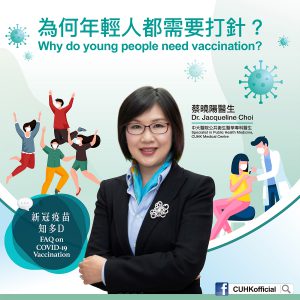Why do young people need vaccination?
Why do young people need vaccination?
Since the commencement of the COVID-19 Vaccination Programme on 26 February, the vaccination rate for the 16-19 age group has been only about 1.4%, and for the 20-29 age group it is only 9.3%. Much attention has been drawn to this vaccination rate which, overall, is still far below the threshold for reaching herd immunity or loosening the anti-epidemic measures to resuming economic activities. We have invited Dr. Jacqueline Choi, Specialist in Public Health Medicine, CUHK Medical Centre, to explain the importance of young people getting vaccinated.
———————
Q: Some young people consider themselves strong enough without any serious illness, which makes them hesitant about getting vaccinated. What suggestions do you have?
A: Figures have shown that there is an upward trend in the hospitalisation rate and mortality rate when young people get infected with the coronavirus. According to the Pan American Health Organization (PAHO), the hospitalisation rate for people under 39 rose by more than 70 per cent in Chile during the past few months. In some areas of the U.S., more people aged between 20-29 are now being hospitalised for COVID-19 than people aged 70-79. Experts explain that young people have stronger immune system and can fight the virus more persistently. Therefore, they may remain in hospital for weeks. Countries must be prepared for surging hospital demand.
According to the data from the Hong Kong Centre for Health Protection, young people under 30 makes up a larger proportion of confirmed cases. We suggest young people pay more attention to preventing the virus. The best method is to be vaccinated as soon as possible.
———————
Q: Some people say that young people may have a stronger post-vaccination response to the COVID-19 vaccines and are more likely to experience side effects. Is that true?
A: Like all vaccines, the COVID-19 vaccines can cause side effects, although side effects may not happen on all people. In general, common side effects are usually mild and temporary, including pain and swelling near the injection site, tiredness, headache, muscle pain, chills, joint pain, diarrhoea, fever, etc. The possibility for COVID-19 vaccines to induce severe allergic reaction is slim, but if it does happen, such reaction would usually occur within a few minutes to an hour after getting the jab. Signs of severe allergic reaction include difficulty in breathing, swelling of face and throat, fast heartbeat, severe rash all over the body, dizziness and fatigue.
Vaccines could stimulate the immune system to produce antibodies and related immunologic factors to resist virus invasion. After receiving a dose, it is normal to experience some symptoms, which usually will go away in 1-2 days. Since young people have stronger immune system, their reaction to vaccines could be stronger as well, and the chance of having side effects is higher. Generally, the stronger the side effects, the higher the immune efficacy.
According to the current information, Comirnaty vaccine can be used for people above 16, and Sinovac’s CoronaVac can be used above 18. The two vaccines are not suitable for children now.
———————
Q: How long can the effectiveness of COVID-19 vaccines last?
A: Since the virus and vaccines are still quite new to the world, it is hard to deduce the medium and long-term effectiveness of each type. Medical experts consider that the vaccines could provide protection for 6 months to a year. However, since there have also been cases of mutant strain infection, the effectiveness and immunity of vaccines may be influenced.
Earlier this year, La Jolla Institute for Immunology published a research report. It shows that after recovering from the infection of coronavirus, autoimmunity can last for at least 6 months. Public Health England said that its effectiveness could last for at least 5 months. The immunity provided by the vaccines is similar to naturally generated immunity. Variation in one’s health status may have impact on the effectiveness of the vaccines.





